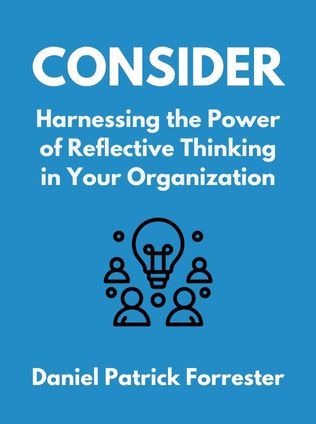
Consider
Harnessing the Power of Reflective Thinking in Your Organization
By Daniel Patrick Forrester
Published 01/2011
About the Author
Daniel Patrick Forrester is a management consultant with over 15 years of experience leading complex strategy and technology evolution engagements for senior executives at various organizations. His profound insights into reflective thinking have influenced many leaders and organizations to rethink their strategies and decision-making processes.
Main Idea
The central premise of "Consider: Harnessing the Power of Reflective Thinking in Your Organization" is the critical importance of reflective thinking in making effective decisions. Forrester argues that in today's fast-paced world, where technology enables instant action, taking time to reflect is often neglected. He provides numerous examples and interviews with leaders to illustrate how think time and reflection can lead to better outcomes, innovation, and solving the right problems.
Table of Contents
- Introduction: The Space Between Data and Meaning
- The Human Need for Think Time: Of Business, Interleaving and Oil Spills
- Forcing Think Time: Of Presidential Commutes, Personal Battle Rhythms, and Making Time to Wonder
- Thinking Out Loud: Of Terminal Niceness, Intellectual Awkwardness and Real Dialogues
- Promoting Think Time: Of Intellectual Freedom, Digital Books and Manly Refrigerators
- Taking a Step Back: From Abusing Email to Exceptional Organizations
- Too Big to Think? Of Cassandras and Cognitive Dissonance
- Rapid Contemplation: Rethinking War in the Middle of War
- Outside the Day-to-Day: From Radical Sabbaticals to Unleashing Reflective Capacity
- Reflection and Extreme Situations: From Commander's Intent to Finding the Middle Ground
- The Future of Think Time and Reflection: From Sovereign Debt to Subway Performances
Introduction: The Space Between Data and Meaning
Dr. Robert Bea's mantra, "Stop, think, and don't do something stupid!" encapsulates the essence of Forrester's message. In an era dominated by the immediate exchange of data, the critical step of reflective thinking often gets bypassed. This chapter emphasizes the invisible marketplace where attention, distraction, data, and meaning are traded, and highlights the importance of creating mental space for reflection to derive meaningful insights and solutions.
Organizations today are often caught up in a relentless cycle of action and reaction, driven by the need for immediate results. This urgency can lead to decisions made without sufficient consideration of their long-term impacts. Forrester's work is a call to slow down, take a step back, and create an environment where thoughtful reflection is not only encouraged but embedded into the organizational culture.
The Human Need for Think Time: Of Business, Interleaving and Oil Spills
Think time is about purposefully carving out periods within our busy schedules to reflect on significant decisions. Forrester provides examples such as Admiral Thad Allen, who used reflective time during crises like Hurricane Katrina and the Deepwater Horizon oil spill to reframe and understand the context of these events. Reflection allows for reconsidering fundamental assumptions and deriving new insights, as exemplified by leaders like Robert Shumsky and Allen, who utilized quiet moments to navigate through complex challenges.
Forrester discusses how think time differs from mere downtime. It involves active engagement with the mind, seeking to understand and question. This purposeful elevation of chunks of work time is essential for making core significant decisions outside of cursory overviews and immediate responses. By dedicating time to think, individuals and organizations can address the underlying issues that may not be apparent during the hustle and bustle of daily activities.
Allen’s story is particularly illustrative. During the aftermath of the Deepwater Horizon explosion, he used his fleeting moments of reflection to help frame the descriptions of the disaster's aftermath. His ability to step back and see the larger picture enabled him to classify the event correctly and thus respond more effectively. This chapter emphasizes the importance of creating deliberate pauses in our work to allow for deeper thinking and better decision-making.
Forcing Think Time: Of Presidential Commutes, Personal Battle Rhythms, and Making Time to Wonder
Historical figures like Abraham Lincoln and contemporary leaders like General David Petraeus and Bill Gates have shown the value of structured think time. Lincoln's commute to his retreat at Soldiers' Home and Petraeus's daily briefings are prime examples of how deliberate separation from daily routines fosters reflective thinking. Gates's "Think Weeks" illustrate the power of isolating oneself to dive deep into new ideas and strategies.
Lincoln’s practice of commuting between the White House and Soldiers' Home provided him with a physical and mental buffer from the pressures of his presidency. This separation allowed him to reflect deeply on his decisions and strategies. Similarly, Petraeus’s commitment to daily briefings ensured that he stayed informed and thoughtful about the complex national security situations he faced. Gates’s Think Weeks are another excellent example, demonstrating how stepping away from the daily grind can lead to significant breakthroughs in thinking and innovation.
Sign up for FREE and get access to 1,400+ books summaries.
You May Also Like
The Subtle Art of Not Giving a F*ck
A Counterintuitive Approach to Living a Good Life
By Mark MansonRich Dad Poor Dad
What the Rich Teach Their Kids About Money - That the Poor and Middle Class Do Not!
By Robert T. KiyosakiHow To Win Friends and Influence People
The All-Time Classic Manual Of People Skills
By Dale CarnegieQuiet: The Power of Introverts
The Power of Introverts in a World That Can't Stop Talking
By Susan Cain



















